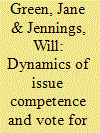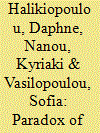|
|
|
Sort Order |
|
|
|
Items / Page
|
|
|
|
|
|
|
| Srl | Item |
| 1 |
ID:
113137


|
|
|
|
|
| Publication |
2012.
|
| Summary/Abstract |
Are citizens in consensus democracies with developed direct democratic institutions more satisfied with their political system than those in majoritarian democracies? In this article, individual-level data from the second wave of the Comparative Study of Electoral Systems and an updated version of Lijphart's multivariate measure of consensus and majoritarian democracy covering 24 countries are used to investigate this question. The findings from logistic multilevel models indicate that consensual cabinet types and direct democratic institutions are associated with higher levels of citizens' satisfaction with democracy. Furthermore, consensus democracy in these institutions closes the gap in satisfaction with democracy between losers and winners of elections by both comforting losers and reducing the satisfaction of winners. Simultaneously, consensus democracy in terms of electoral rules, the executive-legislative power balance, interest groups and the party system reduces the satisfaction of election winners, but does not enhance that of losers.
|
|
|
|
|
|
|
|
|
|
|
|
|
|
|
|
| 2 |
ID:
113138


|
|
|
|
|
| Publication |
2012.
|
| Summary/Abstract |
This article develops the reward-punishment issue model of voting using a newly collated aggregate measure of issue competence in Britain between 1971 and 1997, revealing systematic differences between governing and opposition parties in the way citizens' evaluations of party competence are related to vote intention. Using monthly Gallup 'best party to handle the most important problem' and vote intention data, time series Granger-causation tests give support to a classic issue reward-punishment model for incumbents. However, for opposition parties this reward-punishment model does not hold: macro-issue competence evaluations are Granger-caused by changes in vote choice or governing party competence. An explanation is offered based upon the differentiating role of policy performance and informational asymmetries, and the implications are considered for comparative studies of voting, public opinion and for political party competition.
|
|
|
|
|
|
|
|
|
|
|
|
|
|
|
|
| 3 |
ID:
113139


|
|
|
|
|
| Publication |
2012.
|
| Summary/Abstract |
What can explain the strong euroscepticism of radical parties of both the right and the left? This article argues that the answer lies in the paradoxical role of nationalism as a central element in both party families, motivating opposition towards European integration. Conventionally, the link between nationalism and euroscepticism is understood solely as a prerogative of radical right-wing parties, whereas radical left-wing euroscepticism is associated with opposition to the neoliberal character of the European Union. This article contests this view. It argues that nationalism cuts across party lines and constitutes the common denominator of both radical right-wing and radical left-wing euroscepticism. It adopts a mixed-methods approach, combining intensive case study analysis with quantitative analysis of party manifestos. First, it traces the link between nationalism and euroscepticism in Greece and France in order to demonstrate the internal validity of the argument. It then undertakes a cross-country statistical estimation to assess the external validity of the argument and its generalisability across Europe.
|
|
|
|
|
|
|
|
|
|
|
|
|
|
|
|
| 4 |
ID:
113140


|
|
|
|
|
| Publication |
2012.
|
| Summary/Abstract |
This article compares the tactic of trashing genetically modified crops in activist campaigns in Britain and France. In Britain, most crop trashing was carried out covertly, while in France most activists undertook open, public actions. In seeking an explanation for this, the article shows that the analysis of political opportunities, dominant in comparative studies of social movements, can only take us so far. While it helps explain the occurrence of direct action, it is much less useful in explaining the tactical differences between each country. It is argued that a fuller explanation requires an understanding of how action was shaped by different activist traditions. In France, action was staged as a demonstration of serious, responsible, collective Republican citizenship; in the United Kingdom, activists combined a sceptical view of legality developing from anarchist individualism with an explicitly non-threatening, playful, ethos. The article concludes that a focus on activist traditions can provide an effective bridge between structural and cultural approaches to understanding the determinants of social movement action.
|
|
|
|
|
|
|
|
|
|
|
|
|
|
|
|
|
|
|
|
|